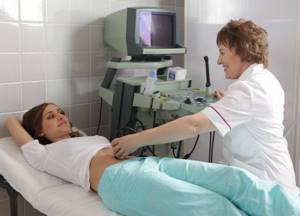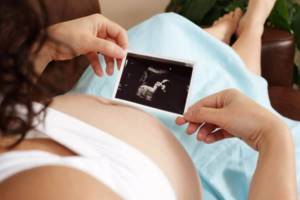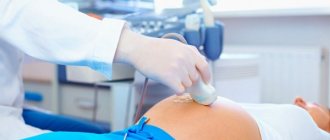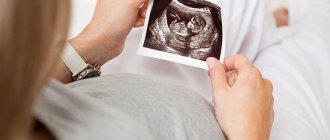Any woman who finds out she is pregnant will be advised by her gynecologist to undergo first trimester screening.
Screening is an examination that includes a set of procedures that allows you to assess the intrauterine condition of the fetus, exclude or confirm the likelihood of having a child with developmental defects or genetic abnormalities.
In Russia, 2 screenings are carried out during a woman’s pregnancy. The third screening sometimes means a routine ultrasound at the 32nd week of pregnancy. In this article we will talk in detail about first trimester screening.
General rules
Prenatal screening , carried out in the first and second trimesters of pregnancy, refers to examination methods that allow a comprehensive assessment of fetal development in the early stages of pregnancy and timely identification of a group at risk for abnormal fetal development and the birth of a child with chromosomal disorders.
Complete combined screening of the first two periods of pregnancy includes:
- Prenatal screening of the first trimester from 11 weeks to 14 weeks of pregnancy (according to the date of the last menstrual period). It includes ultrasound (markers of the first trimester are the presence of nasal bone, coccygeal-parietal size of the fetus and the thickness of the nuchal translucency) and biochemical screening - a double test, including a blood test for human chorionic hormone (hCG) and plasma protein A (PAPP-A).
- Prenatal screening in the second trimester (from 16 to 20 weeks of pregnancy). Includes ultrasound (allows you to study in detail all systems and organs of the child, to exclude most fetal development anomalies - defects of the cardiovascular and urinary systems, musculoskeletal system, face and brain) and a triple biochemical test (blood test for hCG , alpha-fetoprotein ( AFP) and free estriol ).
- Computer processing of the results obtained and calculation of genetic risk taking into account many factors (woman’s age, presence of chronic diseases, weight, hereditary diseases in the family, presence of toxicosis). It is necessary to understand that the results obtained determine only probable risks and do not constitute a basis for making a diagnosis. However, if there is a high risk of developing pathology, a consultation with a geneticist and, if necessary, additional studies are prescribed.
How to properly prepare for examinations and is a diet prescribed before screening?
Any diet before screening of the 1st trimester in the classical sense of this definition is not prescribed, however, to obtain the most informative and reliable results, it is recommended to follow certain nutritional rules.
Ultrasound - if the examination is performed transvaginally (the sensor is located in the vagina), no special preparation is required. With the transabdominal examination method (the sensor is in contact with the abdominal wall), the bladder must be filled with fluid. To do this, it is recommended not to urinate 3-4 hours before the procedure, or drink 0.5 liters of still water 1-1.5 hours and a half hours before the procedure. Drinking strong tea and coffee is not recommended, as this may affect the information content of the procedure.
Biochemical screening is carried out only after an ultrasound, which makes it possible to reliably determine the gestational age, since the quantitative indicators of biochemical tests largely depend on the exact gestational age and the norms of indicators change daily. Blood sampling should only be done on an empty stomach, which should be preceded by fasting for 6-10 hours before the procedure. For the accuracy of the analysis, it is recommended to observe some dietary restrictions for several days before the first screening.
You should avoid taking fatty meats and meat products (smoked meats, bacon, lard, sausages, canned food), animal and cooking fats, margarine, fatty foods, chocolate, seafood, nuts, and chicken eggs. It is not recommended to consume fried foods, spices and seasonings, as well as foods that increase gas formation in the intestines (all types of legumes, rye bread, cabbage). It is prohibited to drink highly carbonated and caffeine-containing drinks (cocoa, tea, coffee).
The diet should include boiled chicken, vegetable oils, cereals, butter, fresh and boiled vegetables, honey, pasta. It should be understood that screening in the 1st trimester of pregnancy does not detect 100% of chromosomal abnormalities, therefore, screening in the second period of pregnancy is necessary.
The diet before screening in the 2nd trimester is not fundamentally different.
Ultrasound - at this stage, no preparation for the examination is required, since the intestines, even in the presence of gases, are already behind the uterus, and the presence of fluid in the bladder is not necessary, since amniotic fluid is present in the uterus.
Biochemical screening - 3 days before the scheduled procedure, it is necessary to exclude from the diet all products that have a pronounced allergic potential, even if you are not a person with hypersensitivity to allergens (seafood, citrus fruits, chocolate, chicken eggs, dairy products, nuts, fruits and red and yellow vegetables, smoked meats and very fatty dishes).
All other dietary restrictions correspond to nutritional recommendations during the period of biochemical screening in the 1st trimester. Blood is taken on an empty stomach, the last meal should be 8-12 hours before the procedure.
Examinations carried out in the 2nd trimester make it possible to fairly accurately assess all the risks of having a child with pathology of intrauterine development. It should be taken into account that unreliable test results may occur in cases where a woman has obesity , diabetes mellitus , IVF, or multiple pregnancies.
Ultrasound screening 1st trimester: preparation for the procedure
- Before the ultrasound procedure, it is undesirable to consume foods that cause increased gas formation - baked goods, legumes, cabbage, grapes, soda , etc. Try to cleanse the intestines in a timely manner.
- On the eve of the ultrasound, you should refrain from sexual contact. This way you eliminate unnecessary physical activity. There is no need to worry before the examination; tune in to positive emotions.
- Nervous stress promotes additional production of adrenaline and cortisol, which leads to distortion of analysis results.
- Come for your examination early. You should feel comfortable. Check the availability of the exchange card and necessary documents.
- Take care of your own hygiene items. a diaper and paper towels with you . Choose clothes in such a way that you can comfortably expose your lower abdomen.
- Just in case, take a bottle of drinking water. If it is necessary to examine the genitourinary system, the doctor will ask you to drink water.
You may need to drink water
The ultrasound procedure may include a transvaginal examination. In this case, you need to purchase a condom for the scanning sensor. You can check this with your gynecologist in advance.
- When undergoing 1st trimester screening , it is important to remember that any detected abnormalities are not a death sentence.
- The main task of the expectant mother is to adhere to all the doctor’s recommendations. If you find it difficult to control your own emotions, then enlist the support of your husband or relatives.
Authorized Products
The diet before screening of the 1st and 2nd trimester includes boiled chicken meat, premium pasta, porridge cooked in water (buckwheat, rice, wheat), white bread crackers, sweet tea with jam, wheat bread, various juices, still mineral water , compotes, fruit drinks, vegetables and fruits of non-red and orange colors - pears, apples, plums, prunes.
Table of permitted products
| Proteins, g | Fats, g | Carbohydrates, g | Calories, kcal | |
Vegetables and greens | ||||
| potato | 2,0 | 0,4 | 18,1 | 80 |
| boiled carrots | 0,8 | 0,3 | 5,0 | 25 |
Fruits | ||||
| apricots | 0,9 | 0,1 | 10,8 | 41 |
| watermelon | 0,6 | 0,1 | 5,8 | 25 |
| melon | 0,6 | 0,3 | 7,4 | 33 |
| peaches | 0,9 | 0,1 | 11,3 | 46 |
Cereals and porridges | ||||
| buckwheat | 4,5 | 2,3 | 25,0 | 132 |
| semolina | 3,0 | 3,2 | 15,3 | 98 |
| oatmeal with water | 3,0 | 1,7 | 15,0 | 88 |
| cereals | 11,9 | 7,2 | 69,3 | 366 |
| pearl barley porridge on water | 3,1 | 0,4 | 22,2 | 109 |
| white boiled rice | 2,2 | 0,5 | 24,9 | 116 |
Flour and pasta | ||||
| noodles | 12,0 | 3,7 | 60,1 | 322 |
Bakery products | ||||
| sliced loaf | 7,5 | 2,9 | 50,9 | 264 |
| wheat bread | 8,1 | 1,0 | 48,8 | 242 |
Confectionery | ||||
| jam | 0,3 | 0,2 | 63,0 | 263 |
| marshmallows | 0,8 | 0,0 | 78,5 | 304 |
| paste | 0,5 | 0,0 | 80,8 | 310 |
Raw materials and seasonings | ||||
| honey | 0,8 | 0,0 | 81,5 | 329 |
| milk sauce | 2,0 | 7,1 | 5,2 | 84 |
Bird | ||||
| boiled chicken breast | 29,8 | 1,8 | 0,5 | 137 |
| boiled turkey fillet | 25,0 | 1,0 | — | 130 |
Non-alcoholic drinks | ||||
| mineral water | 0,0 | 0,0 | 0,0 | — |
Juices and compotes | ||||
| compote | 0,5 | 0,0 | 19,5 | 81 |
| juice | 0,3 | 0,1 | 9,2 | 40 |
| apricot juice | 0,9 | 0,1 | 9,0 | 38 |
| jelly | 0,2 | 0,0 | 16,7 | 68 |
| pumpkin juice | 0,0 | 0,0 | 9,0 | 38 |
| * data is per 100 g of product | ||||
Features of the diagnostic procedure
The first screening examination will not show any visible abnormalities in the embryo, but will only conditionally identify the presence of intrauterine pathologies or the risk of having a child with abnormalities, including Down and de Lange syndromes.
Screening in the 1st trimester is not a mandatory procedure, but at 12 weeks it is prescribed to women at risk. Signs of being classified as such are:
- age – 35 years and older;
- genetic predisposition;
- viral infections;
- fetal pathologies, stillborn babies;
- consanguineous marriages;
- use of drugs, alcoholic beverages and medications;
- genetic abnormalities in born children;
- work associated with hazardous conditions.
In the absence of such indications, spouses can be examined at will.

Screening consists of several procedures:
- ultrasound examination of the fetus and placenta;
- biochemistry of blood from a vein.
Ultrasound determines body features, head size, blood supply to the baby, water volumes, bipaterial dimensions of the parietal tubercles, pathologies of the placenta, cervix, and uterine tone. If abnormalities in the development of the fetus are clearly visible during scanning, parents are informed about this, recommendations are given, approximate forecasts are made, and decisions are made on further actions.
During ultrasound scanning, transvaginal (inserted into the vagina) and transabdominal sensors (along the lower abdomen) are used. If necessary or as prescribed, Doppler sonography is performed. Ultrasound examination is a painless procedure.
During biochemical screening, hCG and protein levels are determined.
The results obtained are entered into the interface of a special software package, which calculates the numerical value of the risks of a particular pathology. In the transcript, this information is presented in the form of MoM - a coefficient indicating the deviation of the value of a particular characteristic in a given pregnant woman from the average, or normal.
Results are known within 24-48 hours. In public medical institutions, the period is extended to 20 days. Based on the results of the examination, doctors draw conclusions about the normal development of the fetus.

How to prepare for the examination
For screening to show the correct picture, it is necessary to properly prepare for the procedure.
Preparation for the first stage of perinatal examination consists of the following:
- hygiene of the external genitalia before ultrasound;
- easily removable clothing;
- You need to buy a diaper at the state clinic or take a towel from home;
- Do not urinate for two to three hours, or start drinking water for an hour and a half (mineral water with gases should not be consumed).
Blood for biochemistry is taken on an empty stomach or 6-8 hours after a meal.
If there is more than 7-8 hours between the ultrasound and the blood draw, you are allowed to eat a light breakfast.
Fully or partially limited products
Before screening of the 1st and 2nd trimesters, smoked, fatty, spicy and fried foods, all dairy products, fish and red meat, meat and fish delicacies, canned food, chicken eggs, animal and cooking fat, nuts, carbonated and caffeinated drinks ( Pepsi, tea, coffee, cola), chocolate. Oranges, lemons, avocados, tangerines, and bananas are excluded from fruits. The consumption of legumes, cabbage, spices and seasonings, rye bread, and alcohol-containing drinks is not allowed.
Table of prohibited products
| Proteins, g | Fats, g | Carbohydrates, g | Calories, kcal | |
Vegetables and greens | ||||
| vegetables legumes | 9,1 | 1,6 | 27,0 | 168 |
| sauerkraut | 1,8 | 0,1 | 4,4 | 19 |
| white radish | 1,4 | 0,0 | 4,1 | 21 |
| celery (root) | 1,3 | 0,3 | 6,5 | 32 |
| horseradish | 3,2 | 0,4 | 10,5 | 56 |
| garlic | 6,5 | 0,5 | 29,9 | 143 |
| spinach | 2,9 | 0,3 | 2,0 | 22 |
| sorrel | 1,5 | 0,3 | 2,9 | 19 |
Mushrooms | ||||
| mushrooms | 3,5 | 2,0 | 2,5 | 30 |
Nuts and dried fruits | ||||
| nuts | 15,0 | 40,0 | 20,0 | 500 |
| dried fruits | 2,3 | 0,6 | 68,2 | 286 |
Flour and pasta | ||||
| vareniki | 7,6 | 2,3 | 18,7 | 155 |
| dumplings | 11,9 | 12,4 | 29,0 | 275 |
Confectionery | ||||
| cookie | 7,5 | 11,8 | 74,9 | 417 |
Cakes | ||||
| cake | 4,4 | 23,4 | 45,2 | 407 |
Chocolate | ||||
| chocolate | 5,4 | 35,3 | 56,5 | 544 |
Raw materials and seasonings | ||||
| seasonings | 7,0 | 1,9 | 26,0 | 149 |
| mustard | 5,7 | 6,4 | 22,0 | 162 |
| ginger | 1,8 | 0,8 | 15,8 | 80 |
| ketchup | 1,8 | 1,0 | 22,2 | 93 |
| mayonnaise | 2,4 | 67,0 | 3,9 | 627 |
| ground black pepper | 10,4 | 3,3 | 38,7 | 251 |
| chilli | 2,0 | 0,2 | 9,5 | 40 |
Dairy | ||||
| dairy products | 3,2 | 6,5 | 4,1 | 117 |
| cream 35% (fat) | 2,5 | 35,0 | 3,0 | 337 |
Cheeses and cottage cheese | ||||
| cheese | 24,1 | 29,5 | 0,3 | 363 |
Meat products | ||||
| pork | 16,0 | 21,6 | 0,0 | 259 |
| salo | 2,4 | 89,0 | 0,0 | 797 |
| bacon | 23,0 | 45,0 | 0,0 | 500 |
| ham | 22,6 | 20,9 | 0,0 | 279 |
Sausages | ||||
| dry-cured sausage | 24,1 | 38,3 | 1,0 | 455 |
| sausages | 10,1 | 31,6 | 1,9 | 332 |
Bird | ||||
| fried chicken | 26,0 | 12,0 | 0,0 | 210 |
| smoked chicken | 27,5 | 8,2 | 0,0 | 184 |
| duck | 16,5 | 61,2 | 0,0 | 346 |
| goose | 16,1 | 33,3 | 0,0 | 364 |
Fish and seafood | ||||
| smoked fish | 26,8 | 9,9 | 0,0 | 196 |
| canned fish | 17,5 | 2,0 | 0,0 | 88 |
Oils and fats | ||||
| cooking fat | 0,0 | 99,7 | 0,0 | 897 |
Alcoholic drinks | ||||
| dry white wine | 0,1 | 0,0 | 0,6 | 66 |
| dry red wine | 0,2 | 0,0 | 0,3 | 68 |
| vodka | 0,0 | 0,0 | 0,1 | 235 |
| cognac | 0,0 | 0,0 | 0,1 | 239 |
| beer | 0,3 | 0,0 | 4,6 | 42 |
Non-alcoholic drinks | ||||
| bread kvass | 0,2 | 0,0 | 5,2 | 27 |
| * data is per 100 g of product | ||||
What other factors influence the results?
Screening results may be false for several reasons.
- Overweight or underweight during pregnancy. Hormone levels will deviate significantly from normal.
- Artificial insemination, IVF. To prepare a woman, large doses of medications are used, which distorts the hormonal picture.
- Multiple pregnancy. All indicators will be overestimated taking into account several fetuses in the uterus.
Diabetes mellitus may also affect screening results.
One of the important factors is the woman’s unstable mental state. The results will be distorted due to the release of hormones into the blood: cortisol and adrenaline.
Results and reviews
The diet before screening of the 1st and 2nd trimester allows you to obtain reliable information about the indicators of biochemical screening.
- “... My husband and I decided that I should definitely undergo screening, but I was not warned that a few days before taking the test for AFP and hCG I should not eat fish, chicken eggs, dairy or spicy foods. And I broke my diet. The results, in principle, are almost normal, but I decided, just in case, to play it safe and take the test again in another laboratory, this time in compliance with all the requirements”;
- “... I signed up for screening, I really want to have a healthy child. Now I've been on a diet for 2 days. Grandmother (87 years old) laughs and says, what have you come up with? We gave birth to 4-5 children without any examinations and all were healthy and hard-working. It is difficult for her to explain that the time was different - they ate healthy food without preservatives and dyes, drank clean water from the well and breathed clean air. And we are children of civilization with all the pros and cons, so screening for us is simply a necessity.”
1st trimester screening: importance of examination
- Some mothers underestimate the importance of the first screening and do not consider this examination mandatory.
The first screening is a highly informative study and allows you to identify a number of deviations from the norm:
- Deviations in the development of the neural tube
- Incorrect location of internal organs
- Control of chromosome set
- Syndromes of genetic origin

Questionable examination results are repeated in the near future in another medical institution. Screening in the 1st trimester of pregnancy allows you to minimize risks for the mother and her baby.






